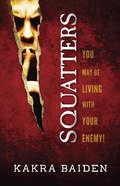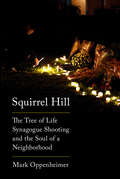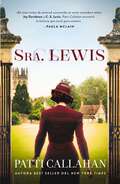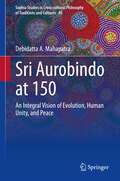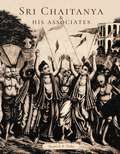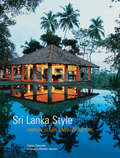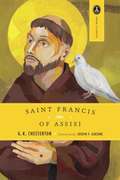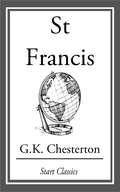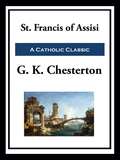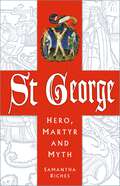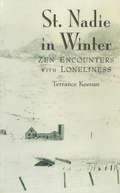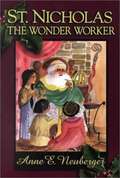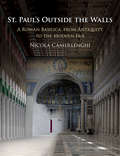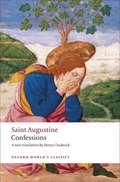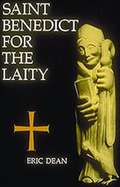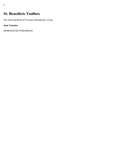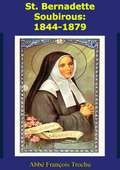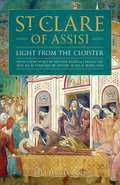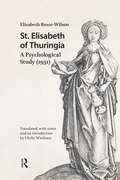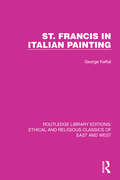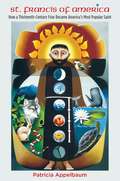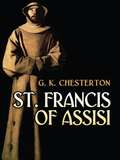- Table View
- List View
Squatters: You May Be Living With Your Enemy!
by Kakra BaidenHow to live free from demonic oppression. There's conflict in your home, or trouble in the workplace. Family problems, sickness, financial struggles. You've done everything you know to fix things, but the challenges continue. The issue may not be with the people around you--but with the unseen presence of evil. Demonic spirits try to settle in places that don't belong to them, to keep God's children from living in their rightful fullness. It's eviction time! Learn how you can take territorial control of your life and drive out the enemy. Combining biblical teaching and personal experience, anointed minister Kakra Baiden explains how you can command any “spiritual squatters” to be gone, and instead live in the peace and presence of the Holy Spirit.
Squirrel Hill: The Tree of Life Synagogue Shooting and the Soul of a Neighborhood
by Mark OppenheimerA piercing portrait of the struggles and triumphs of one of America's renowned Jewish neighborhoods in the wake of unspeakable tragedy that highlights the hopes, fears, and tensions all Americans must confront on the road to healing.Squirrel Hill, Pittsburgh, is one of the oldest Jewish neighborhoods in the country, known for its tight-knit community and the profusion of multigenerational families. On October 27, 2018, a gunman killed eleven Jews who were worshipping at the Tree of Life synagogue in Squirrel Hill--the most deadly anti-Semitic attack in American history. Many neighborhoods would be understandably subsumed by despair and recrimination after such an event, but not this one. Mark Oppenheimer poignantly shifts the focus away from the criminal and his crime, and instead presents the historic, spirited community at the center of this heartbreak. He speaks with residents and nonresidents, Jews and gentiles, survivors and witnesses, teenagers and seniors, activists and historians. Together, these stories provide a kaleidoscopic and nuanced account of collective grief, love, support, and revival. But Oppenheimer also details the difficult dialogue and messy confrontations that Squirrel Hill had to face in the process of healing, and that are a necessary part of true growth and understanding in any community. He has reverently captured the vibrancy and caring that still characterize Squirrel Hill, and it is this phenomenal resilience that can provide inspiration to any place burdened with discrimination and hate.
Sra. Lewis: La improbable historia de amor entre Joy Davidman y C. S. Lewis
by Patti CallahanEn una amistad muy improbable, ella encontró el amor. En un mundo donde las mujeres fueron silenciadas, ella encontró su voz. En un Dios más allá de su religión familiar, ella encontró la fe.De la autora de éxitos en ventas del New York Times, Patti Callahan, llega una exquisita novela sobre Joy Davidman, la mujer a la que C.S. Lewis llamó “mi mundo entero”. Cuando la poeta y escritora Joy Davidman comenzó a escribirle cartas a C.S. Lewis –conocido como Jack– ella buscaba respuestas espirituales, no amor. Después de todo, el amor no lograba mantener unido a su desmoronado matrimonio. Todo acerca de la neoyorkina Joy parecía estar mal para el catedrático de Oxford y amado escritor de Narnia, pero sus mentes se fueron amalgamando en sus cartas. Embarcándose en la aventura de su vida, Joy viajó de Estados Unidos a Inglaterra y luego regresó, enfrentando angustia y pobreza, descubriendo la amistad y la fe, y contra todo pronóstico, encontrando un amor que aun la amenaza de la muerte no podía destruir.En esta exploración magistral de una de las mejores historias de amor de los tiempos modernos, nos encontramos con una brillante escritora, una madre ferozmente independiente y una mujer apasionada que cambió la vida de este respetado autor e inspiró libros que todavía nos encantan y cambian nuestra vida. Joy vivió en un momento en que las mujeres no debían tener voz y, sin embargo, su amor por Jack les otorgó las dos voces que ellos no sabían que poseían.Una fascinante novela histórica y una vislumbre de la vida de un escritor, combinadas en una pieza. Este libro es, sobre todo, una historia de amor: un amor por la literatura y las ideas y un amor entre marido y mujer que, al final, no resultó imposible en absolute.
Sri Aurobindo at 150: An Integral Vision of Evolution, Human Unity, and Peace (Sophia Studies in Cross-cultural Philosophy of Traditions and Cultures #40)
by Debidatta A. MahapatraThis book brings to focus one of the prominent 20th century Indian thinkers, Sri Aurobindo, by providing an overview of his philosophy on life and yoga, and by elucidating his thought in the context of contemporary society. This text is unique in approaching Sri Aurobindo as a problem solver and from a conflict resolution perspective, the latter being the author’s expertise. Sri Aurobindo’s contributions such as Ideal of Human Unity, Integral Yoga, Life Divine and his poetic vision as embodied in his epic poem, Savitri, are explored in-depth. The book explores these ideas to seek possible solutions to the current predicaments of human life and society. This monograph attracts not only students and researchers in the fields of philosophy, religion, yoga, political science, international politics, Indian thought, and conflict resolution, but also general interest readers.
Sri Chaitanya & His Associates
by Swami B. B. Tirtha Maharaja"In this jewel-like volume, the venerable Tirtha Maharaja recounts the nectarean activities of the associates of Lord Gauranga and the acharyas of the Gaudiya Vaishnava religion." ––Swami B.P. Puri, Founder Acharya, Gopinath Gaudiya MathSrila Bhakti Ballabha Tirtha Goswami Maharaja has gathered a great deal of information about the lives of the devotees from numerous sources, and has made this information more relishable by virtue of his own insight. These biographies of Mahaprabhu's devotees should be read on their appearance and disappearance days, for this will bring great joy to both those who hear and those who read them. In this English translation, it will be possible for devotees around the world to enjoy them. Herein, the author delights in the life stories of Jagannath Mishra, Madhavendra Puri, Ishvara Puri, Advaita Acharya, Srivas Pandit, Chandrasekhar Acharya, Pundarika Vidyanidhi, Gadadhar Pandit, Vakresvara Pandit, Gadadhar Das, Shivananda Sen, Paramananda Puri, Murari Gupta, and many others. Every letter of these accounts is drenched with the nectar of devotion. The sincere seeker will never be able to enter the transcendental kingdom nor to advance in the devotional life unless they also discover this delight.
Sri Lanka Style
by Dominic Sansoni Channa DaswatteSri Lanka Style showcases over 30 of the finest traditional and modern dwellings in Sri Lanka, from private homes to retreats and resorts, all designed by the island's most creative architects and interior designers including some by the world-renowned architect Geoffrey Bawa that have never been seen before. These houses demonstrate the essentials of the Sri Lankan lifestyle-spaces open to the environment and the natural use of space and decor-and contribute to a palpable sense of peace and discipline. In addition, there are practical design ideas that can be applied to any tropical locale.
Sri Lanka Style
by Dominic Sansoni Channa DaswatteSri Lanka Style showcases over 30 of the finest traditional and modern dwellings in Sri Lanka, from private homes to retreats and resorts, all designed by the island's most creative architects and interior designers including some by the world-renowned architect Geoffrey Bawa that have never been seen before. These houses demonstrate the essentials of the Sri Lankan lifestyle-spaces open to the environment and the natural use of space and decor-and contribute to a palpable sense of peace and discipline. In addition, there are practical design ideas that can be applied to any tropical locale.
Sri Ramanuja
by Madabhushini NarasimhacharyaA monograph in English by M. Narasimhachary on the ancient thinker and philosopher, Sri Ramanuja. Includes bibliographical references.
St .Francis of Assisi
by G. K. ChestertonFrancis of Assisi is, after Mary of Nazareth, the greatest saint in the Christian calendar, and one of the most influential men in the whole of human history. By universal acclaim, this biography by G. K. Chesterton is considered the best appreciation of Francis's life--the one that gets to the heart of the matter. For Chesterton, Francis is a great paradoxical figure, a man who loved women but vowed himself to chastity; an artist who loved the pleasures of the natural world as few have loved them, but vowed himself to the most austere poverty, stripping himself naked in the public square so all could see that he had renounced his worldly goods; a clown who stood on his head in order to see the world aright. Chesterton gives us Francis in his world-the riotously colorful world of the High Middle Ages, a world with more pageantry and romance than we have seen before or since. Here is the Francis who tried to end the Crusades by talking to the Saracens, and who interceded with the emperor on behalf of the birds. Here is the Francis who inspired a revolution in art that began with Giotto and a revolution in poetry that began with Dante. Here is the Francis who prayed and danced with pagan abandon, who talked to animals, who invented the creche.
St Antoninus of Florence on Trade, Merchants, and Workers (Toronto Studies in Medieval Law #5)
by Jason Aaron BrownSaint Antoninus of Florence was a Dominican friar and archbishop of Florence from 1446 to 1459. He composed one of the most comprehensive manuals of moral theology, the Summa, which has long been counted among the more copious, influential, and rewarding medieval sources. St Antoninus of Florence on Trade, Merchants, and Workers gives an orientation to the life and teaching of Saint Antoninus, focusing on his writings on economic ethics, and includes a critical edition of his original Latin text with an English translation. The book provides an extensive introduction to his thought, situating it in its intellectual and social context, and elucidates the development of medieval economic and moral doctrines in law and theology. Jason Aaron Brown examines historians’ arguments about Italian business culture in the wake of the medieval “Commercial Revolution” and whether this culture can be considered capitalistic. He concludes that while Saint Antoninus is surprisingly modern in the economic concepts he deploys, his moral teaching on proper means and ends in the marketplace stood against certain nascent capitalistic tendencies in fifteenth-century Florence. Through examination of the manuscripts, this book opens a window into a premodern author’s writing process that will be of interest to scholars of medieval manuscripts and literary production.
St Francis
by G. K. ChestertonBorn in London, Chesterton was educated at St. Paul's, but never went to college. He went to art school. In 1900, he was asked to contribute a few magazine articles on art criticism, and went on to become one of the most prolific writers of all time. He wrote a hundred books, contributions to 200 more, hundreds of poems, including the epic Ballad of the White Horse, five plays, five novels, and some two hundred short stories, including a popular series featuring the priest-detective, Father Brown. In spite of his literary accomplishments, he considered himself primarily a journalist. He wrote over 4000 newspaper essays, including 30 years worth of weekly columns for the Illustrated London News, and 13 years of weekly columns for the Daily News. He also edited his own newspaper, G.K.'s Weekly. (To put it into perspective, four thousand essays is the equivalent of writing an essay a day, every day, for 11 years. If you're not impressed, try it some time. But they have to be good essays, all of them, as funny as they are serious, and as readable and rewarding a century after you've written them.) Chesterton was equally at ease with literary and social criticism, history, politics, economics, philosophy, and theology. His style is unmistakable, always marked by humility, consistency, paradox, wit, and wonder. His writing remains as timely and as timeless today as when it first appeared, even though much of it was published in throw away paper. This man who composed such profound and perfect lines as "The Christian ideal has not been tried and found wanting; it has been found difficult and left untried," stood 6'4" and weighed about 300 pounds, usually had a cigar in his mouth, and walked around wearing a cape and a crumpled hat, tiny glasses pinched to the end of his nose, swordstick in hand, laughter blowing through his moustache. And usually had no idea where or when his next appointment was. He did much of his writing in train stations, since he usually missed the train he was supposed to catch. In one famous anecdote, he wired his wife, saying, "Am at Market Harborough. Where ought I to be?" His faithful wife, Frances, attended to all the details of his life, since he continually proved he had no way of doing it himself. She was later assisted by a secretary, Dorothy Collins, who became the couple's surrogate daughter, and went on to become the writer's literary executrix, continuing to make his work available after his death. This absent-minded, overgrown elf of a man, who laughed at his own jokes and amused children at birthday parties by catching buns in his mouth, was the man who wrote a book called The Everlasting Man, which led a young atheist named C.S. Lewis to become a Christian. This was the man who wrote a novel called The Napoleon of Notting Hill, which inspired Michael Collins to lead a movement for Irish Independence. This was the man who wrote an essay in the Illustrated London News that inspired Mahatma Gandhi to lead a movement to end British colonial rule in India. This was a man who, when commissioned to write a book on St. Thomas Aquinas (aptly titled Saint Thomas Aquinas), had his secretary check out a stack of books on St.
St Francis of Assisi
by G. K. ChestertonSt. Francis of Assisi is perhaps the most important of the non-apostle saints. He was born to wealth and privilege in Assisi, Italy in 1181. As a youth he dreamed of military glory and lived the decadent lifestyle one would expect from of a wealthy, young Italian man. In 1202 Francis went off to war and was subsequently captured and spent a year of hardship in Collestrada as a prisoner of war. In 1205 he set off to war again, but this time God sent him a vision and he returned home and took up a religion. What followed was a most remarkable life. St. Francis founded an order in the Catholic Church devoted to helping those in poverty. No other saint embodied the teaching of Christ in quite such an emblematic way. Here G. K. Chesterton gives us the definitive biography of this most amazing man.
St George: Hero, Martyr and Myth
by Samantha RichesWho was St. George and how did he become patron saint not only of England but in many European countries? Samantha Riches explores the extraordinary wealth of myths and legends, art and inspiration that has grown up around this obscure fourth-century Christian martyr.
St Nadie in Winter
by Terrance KeenanThis revolutionary Buddhist text has already become a minor classic in Zen literature. During dark nights of the soul, the book instructs, we can only follow the Three Guides: No Blame, Be Kind, Love Everything. Author Terrance Keenan's world - boyhood Catholicism, alcoholism, the struggles of maintaining honest relationships with his wife and children - is a mirror for every serious reader who wishes to make sense of life.
St Nicholas, The Wonder Worker
by Anne NeubergerSaintly bishop Tender-hearted gift-giver Noted preacher Indomitable defender Conscientious patron Holy healer Outspoken justice seeker Lover of children Amazing miracle worker Santa Claus! * [Image: The first letter of the lines above are enlarged and vertically spell ST NICHOLAS.] * Introduce your family to the man behind the myths with this irresistible collection of stories about the saint we call Santa Claus. Keep the sense of wonder and joy of belief in Santa alive in the hearts of children of all ages all through the year and especially this Christmas...and every Christmas to come. This book with very short chapters is intended to be read aloud to children or for children and adults of all ages to read by themselves.
St Paul's outside the Walls: A Roman Basilica, from Antiquity to the Modern Era
by Nicola CamerlenghiThis volume examines one of Rome's most influential churches: the principal basilica dedicated to St Paul. Nicola Camerlenghi traces nearly two thousand years of physical transformations to the church, from before its construction in the fourth century, to its reconstruction following a fire in 1823. By recounting this long history, he restores the building to its rightful place as a central, active participant in epochal political and religious shifts in Rome and across Christendom, as well as a protagonist in western art and architectural history. Camerlenghi also examines how buildings in general trigger memories and anchor meaning, and how and why buildings endure, evolve and remain relevant in cultural contexts far removed from the moment of their inception. At its core, Saint Paul exemplifies the concept of building as process, not product: a process deeply interlinked with religion, institutions, history, cultural memory and the arts. This study also includes state-of-the-art digital reconstructions synthesizing a wealth of historical evidence to visualize and analyze the earlier (now lost) stages of the building's history, offering glimpses into heretofore unexamined parts of its long, rich life.
St. Augustine's Confessions
by Saint Augustine Henry ChadwickIn his own day the dominant personality of the Western Church, Augustine of Hippo today stands as perhaps the greatest thinker of Christian antiquity, and his Confessions is one of the great works of Western literature. In this intensely personal narrative, Augustine relates his rare ascent from a humble Algerian farm to the edge of the corridors of power at the imperial court in Milan, his struggle against the domination of his sexual nature, his renunciation of secular ambition and marriage, and the recovery of the faith his mother Monica had taught him during his childhood. Now, Henry Chadwick, an eminent scholar of early Christianity, has given us the first new English translation in thirty years of this classic spiritual journey. Chadwick renders the details of Augustine's conversion in clear, modern English. We witness the future saint's fascination with astrology and with the Manichees, and then follow him through scepticism and disillusion with pagan myths until he finally reaches Christian faith. There are brilliant philosophical musings about Platonism and the nature of God, and touching portraits of Augustine's beloved mother, of St. Ambrose of Milan, and of other early Christians like Victorinus, who gave up a distinguished career as a rhetorician to adopt the orthodox faith. Augustine's concerns are often strikingly contemporary, yet his work contains many references and allusions that are easily understood only with background information about the ancient social and intellectual setting. To make The Confessions accessible to contemporary readers, Chadwick provides the most complete and informative notes of any recent translation, and includes an introduction to establish the context. The religious and philosophical value of The Confessions is unquestionable--now modern readers will have easier access to St. Augustine's deeply personal meditations. Chadwick's lucid translation and helpful introduction clear the way for a new experience of this classic. About the Series:For over 100 years Oxford World's Classics has made available the broadest spectrum of literature from around the globe. Each affordable volume reflects Oxford's commitment to scholarship, providing the most accurate text plus a wealth of other valuable features, including expert introductions by leading authorities, voluminous notes to clarify the text, up-to-date bibliographies for further study, and much more.
St. Benedict for the Laity
by Eric DeanAuthor comments on how the Rule has important things to say even to those of us who - because we are already committed to lives in the secular sphere - can never think of a monastic vocation.
St. Benedict's Toolbox: The Nuts and Bolts of Everyday Benedictine Living
by Jane TomaineWhen St. Benedict formed his first small community of monks at Monte Cassino on the hilltop, Italy--and much of Europe--was ravaged by war. The Roman Empire was breaking apart, and politics, cultural life, and even the Church, were all in disarray. In the midst of these tumultuous times, Benedict offered his followers a “little rule,” a guide about the size of a checkbook, that showed his monks the way to peace as they learned to prefer Christ above all things. <p><p>Though it was written nearly 1500 years ago, the Rule of Benedict still offers the practical tools for living a Christ-centered today. Here in St. Benedict’s Toolbox, readers will find a primer on how to use these tools in their own tumultuous lives. Each chapter examines one aspect of the Rule, from ways of praying to ways of embracing humility, and offers suggestions for prayer, reflection, journaling, and action. As they learn to use Benedict’s tools, readers will discover the power--and the timeliness--of this ancient way of life.
St. Bernadette Soubirous: 1844-1879
by John Joyce Abbé François TrochuST. BERNADETTE SOUBIROUS is a two-fold story: that of the apparition of the Blessed Virgin Mary at Lourdes, France in 1858, as well as of the 14-year-old peasant girl--raised in dire poverty and unable to read--to whom Our Lady appeared. But more, it is also the story of St. Bernadette's hidden life as a seemingly ordinary nun in her convent at Nevers, where she reached such holiness that after her death, God saw fit to preserve her body incorrupt--as it remains to this day!Beautifully set forth in this book are St. Bernadette's childhood and life at home, her character--honest, intelligent and straightforward--her description of Our Lady, the events surrounding the 18 apparitions, the opposition of the civil authorities, and the shrine and miraculous spring at Lourdes. Also described are Bernadette's life in the convent, where she suffered a martyrdom in body and in soul.
St. Clare of Assisi: Light From the Cloister
by Ofs Bret ThomanThis is a short but very readable biography of St. Clare of Assisi whose life intertwined with that of St. Francis. Her life was as a contemplative who had a deep love for poverty and prayer.
St. Elisabeth of Thuringia: A Psychological Study (1931) (Hagiography Beyond Tradition)
by Elisabeth Busse-WilsonOnly twelve years after German women had been granted voting rights, the German medievalist Elisabeth Busse-Wilson, a first-wave feminist activist and scholar, challenged centuries of silence about violence against women by taking on the case of the most famous European saint, the young Elisabeth of Thuringia (1207-1231). Married at a very young age, St. Elisabeth soon fell under the spell of the notorious confessor and inquisitor Konrad von Marburg. His brutal treatment of the young woman was erased from the cult of St. Elisabeth to protect male privilege both in the church and society at large. Published to coincide with the 700-year anniversary of her death, Busse-Wilson's study caused a storm of controversy. Translated for the first time into English, this book reintroduces to a contemporary audience this long-forgotten but still provocative and timely classic.
St. Francis in Italian Painting (Ethical and Religious Classics of East and West #2)
by George KaftalOriginally published in 1950, this book shows that the religious and ethical values that St. Francis was striving after are as essential today as they were in his time. The book presents St. Francis as a complex personality and corrects the rather mawkish interpretation of certain legends. It deals with the environment and development of the saint’s personality and chapters from his biographies by Thomas of Celano or St. Bonaventure and many black and white plates illustrating them which are reproductions of paintings by Italian masters from the XIIIth to the late XVth century.
St. Francis of America
by Patricia AppelbaumHow did a thirteenth-century Italian friar become one of the best-loved saints in America? Around the nation today, St. Francis of Assisi is embraced as the patron saint of animals, beneficently presiding over hundreds of Blessing of the Animals services on October 4, St. Francis's Catholic feast day. Not only Catholics, however, but Protestants and other Christians, Hindus, Buddhists, Jews, and nonreligious Americans commonly name him as one of their favorite spiritual figures. Drawing on a dazzling array of art, music, drama, film, hymns, and prayers, Patricia Appelbaum explains what happened to make St. Francis so familiar and meaningful to so many Americans. Appelbaum traces popular depictions and interpretations of St. Francis from the time when non-Catholic Americans "discovered" him in the nineteenth century to the present. From poet to activist, 1960s hippie to twenty-first-century messenger to Islam, St. Francis has been envisioned in ways that might have surprised the saint himself. Exploring how each vision of St. Francis has been shaped by its own era, Appelbaum reveals how St. Francis has played a sometimes countercultural but always aspirational role in American culture. St. Francis's American story also displays the zest with which Americans borrow, lend, and share elements of their religious lives in everyday practice.
St. Francis of Assisi
by G. K. ChestertonThe patron saint of animals, birds, and the environment, Francis of Assisi led the rediscovery of nature in the Christian West. This magnificent spiritual biography by the phenomenally popular G. K. Chesterton—a convert to Catholicism—chronicles the beloved saint's calling, his extraordinary life, and his influence in the Church. Its charm and wit will appeal to even the most secular-minded readers. How fitting that Francesco Bernardone was born just after the Dark Ages when the world was awakening. He started out as a colorful troubadour with a fondness for French poetry, extravagant with money . . . until the sight of a beggar seeking alms opened his eyes to a world beyond himself. The scene so moved him, he vowed to God that he would devote his life to the poor and embrace a life of simplicity. This sense of humility and generosity continues to call to each of us today. With great affection, Chesterton explores the life and times of St. Francis—his joyous devotion, his sense of compassion and love for all creation, his visions and miracles, his stigmata, and his band of followers that became the Franciscan Order. Praising this great and original man who became one of the most popular figures in Christendom, the author calls him "a poet whose whole life was a poem." Here is a stimulating read for Chesterton fans, Christian readers, and anyone looking for a burst of pure inspiration.
